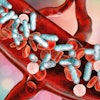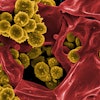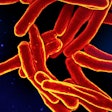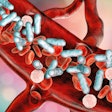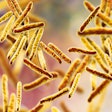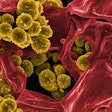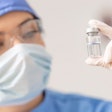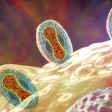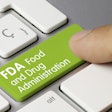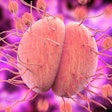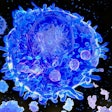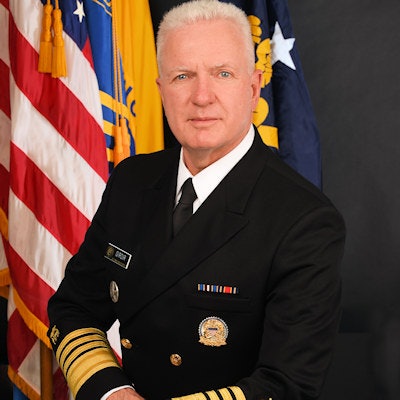
Supply shortages have plagued the U.S. response to COVID-19 testing, and the federal government is open to new ideas for solutions, according to a presentation by White House COVID-19 testing lead Admiral Dr. Brett Giroir in a speech at the American Association for Clinical Chemistry (AACC) annual meeting.
Giroir, who is the assistant secretary for health at the U.S. Department of Health and Human Services, has been the face of the Trump administration's response on diagnostic testing to the coronavirus pandemic. But during a special session at the AACC 2020 meeting, which is being held in a virtual format from December 13-17, he said he's not one for Washington-style jargon.
 Admiral Dr. Brett Giroir. Image courtesy of the U.S. Department of Health and Human Services.
Admiral Dr. Brett Giroir. Image courtesy of the U.S. Department of Health and Human Services.As of December 13, more than 213 million SARS CoV-2 diagnostic tests, excluding point-of-care, had been conducted in the U.S. and the end of the pandemic is in sight with the rollout of vaccines this week, he noted. That's the bright side, as there has been a massive surge in COVID-19 cases across the country and the pandemic has exposed weaknesses in the way the U.S. diagnostic infrastructure is managed.
Giroir described the U.S. supply chain at the start of the pandemic as a "wreck." There was no supply chain -- nothing in the stockpile -- but Giroir said that he doubts that will ever happen again. Diagnostic testing is a core part of pandemic emergency response, and the country must be better prepared in the next decade than we were in the past decade, he added.
Giroir fielded several questions about the persistent lack of testing supplies, which forces labs to run tests on several platforms. He responded that government officials are in regular contact with testing manufacturers, analyzing availability in various communities.
Certain brands -- such as products from Roche, Danaher, and Cepheid -- are difficult to scale up sufficiently to meet needs during the pandemic. This is partly due to specialized machinery and complex chemistries. The administration has invested hundreds of millions of dollars to boost capacity and labs can expect to see some greater quantities next year, he said.
Other brands, such as Thermo Fisher Scientific products, are widely available. Asked whether the government could publish detailed information about the availability and distribution of supplies, Giroir said that it could provide general information but that the specifics are considered proprietary and confidential.
Giroir also noted that the government is doing a lot of federal procurement and is delivering supplies -- such as swabs and media -- to states upon request by governors on a monthly basis. But labs may or may not be getting these products.
"That distribution within the states is sometimes great and sometimes not," he said.
Lately, pipette tips have been in short supply, and to address this need, Giroir said he has air lifts coming in from all over the world and is also working to validate new products. The government is investing everything it can to plug the gap, according to Giroir.
Giroir advised attendees of AACC 2020 that if they have ideas for supply chain solutions to transmit them to the AACC for review by the government.
"I promise you there is no good idea we don't try to uncover and work through," Giroir said.
Giroir also called for greater coordination between different types of laboratories and industry players. There is a "huge universe" in testing, including Quest and LabCorp, which have done a huge volume of COVID-19 testing, public health laboratories, hospital-based laboratories, and physician offices. The government has had greater visibility into the large testing companies and hospital systems rather than the testing ecosystem as a whole, he said.
There is some "dog-eat-dog" competition between laboratories and between diagnostic manufacturers that presents a barrier for an effective national response during pandemics, in Giroir's view. A formal mechanism should be established to facilitate collaboration given multiple competing players, he suggested.
The Laboratory Response Network (established by the U.S. Centers for Disease Control and Prevention) was effective for small outbreaks like anthrax but is "not sufficient by a long shot" for a large pandemic like COVID-19, Giroir said.
A potential model for the future of diagnostic testing infrastructure is the North American Electric Reliability Corporation, the Atlanta-based nonprofit international regulatory authority that ensures the reliability and security of power systems. Input on this from the laboratory community is welcome, according to Giroir.
"It is sort of irrefutable that the United States needs to maintain a prospective national diagnostic strategy and a stockpile -- whether that is a physical stockpile in a warehouse or a virtual stockpile -- like we are doing for [personal protective equipment], to prepare for future national and global challenges," Giroir said.

